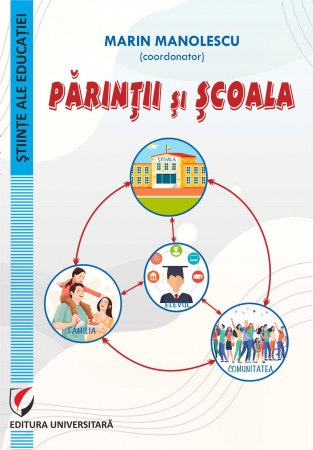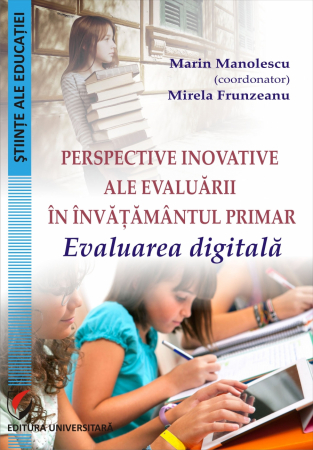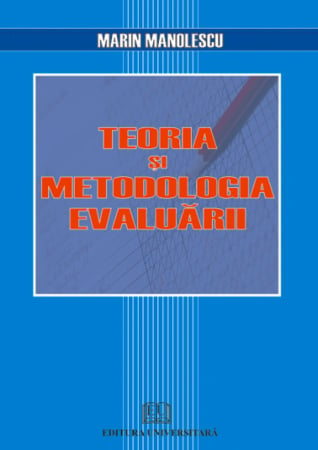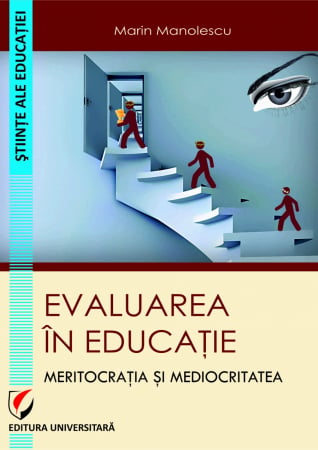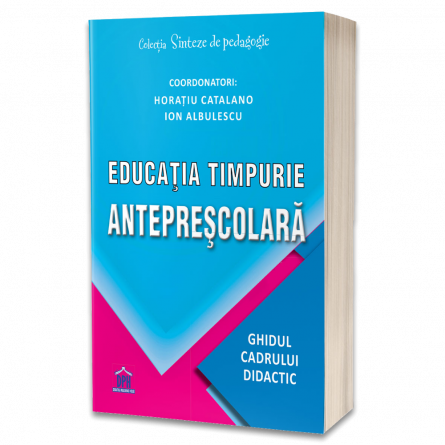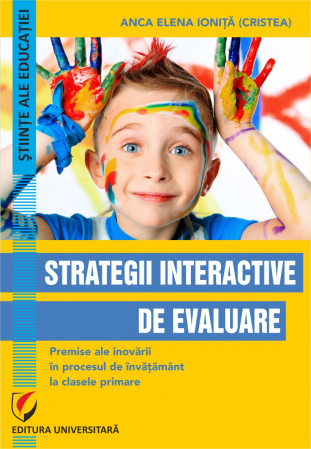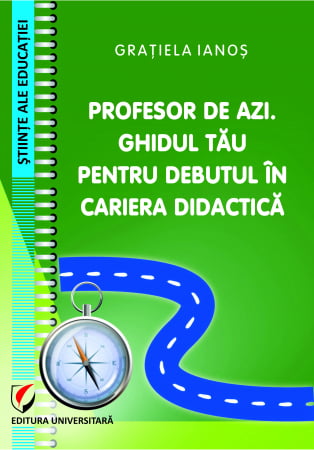Manuscript proposals: [email protected] / 0745 204 115 //// Tracking orders Individuals / Sales: 0745 200 357 / Orders Legal entities: 0721 722 783
Publisher: Editura Universitară
Author: Oprea-Valentin Busu
ISBN: 978-606-28-1277-5
DOI: https://doi.org/10.5682/9786062812775
Publisher year: 2021
Edition: I
Pages: 122
Product Code:
9786062812775
Do you need help?
0745 200 357
- Description
- Download (1)
- Authors
- Content
- More details
- Reviews (0)
The author highlights a series of aspects, often neglected, faced by the Romanian educational environment today, including the central role of thinking, understanding in learning, not only perception, memory and attention, the functional teacher-student relationship focused on the need for to learn and know for life.
In the educational sector it is necessary a fine and thorough knowledge of the psychology of the pupil / student, as this greatly influences the quality of the educational act.
Another important element that was emphasized in this book was that of the psychogenetic landmarks of development. Understanding the epigenetics, the functioning of the nervous system through the prism of biochemical and biophysical processes developed at this level helps us to find ways to stimulate student creativity and to achieve school performance. Also, the social environment in which the pupil / student lives is indicated as important, because it contributes to the modeling of the hereditary factor indirectly.
Didactic communication is another subject of great interest, being intensely debated in this course, with the recommendation to be made assertively by efficiently combining all types of communication.
Through the current topics, the paper emphasizes the dynamics of teaching, being meant to guide future teachers and improve them in the educational process.
In the educational sector it is necessary a fine and thorough knowledge of the psychology of the pupil / student, as this greatly influences the quality of the educational act.
Another important element that was emphasized in this book was that of the psychogenetic landmarks of development. Understanding the epigenetics, the functioning of the nervous system through the prism of biochemical and biophysical processes developed at this level helps us to find ways to stimulate student creativity and to achieve school performance. Also, the social environment in which the pupil / student lives is indicated as important, because it contributes to the modeling of the hereditary factor indirectly.
Didactic communication is another subject of great interest, being intensely debated in this course, with the recommendation to be made assertively by efficiently combining all types of communication.
Through the current topics, the paper emphasizes the dynamics of teaching, being meant to guide future teachers and improve them in the educational process.
-
The psychology of education. Course notes
Download
OPREA VALENTIN BUSU
Chapter I
Psychology of education as a study discipline / 9
Definition and objective of educational psychology / 9
Chapter II
Psychogenetic landmarks of development / 14
Factors of psychic development: Heredity, Environment, Education / 14
The staged theory of psychic development / 15
Learning and mental development / 25
The relationship between learning and mental development / 25
Adolescent / 26
Chapter III
Learning psychology / 28
Introduction / 28
Forms of learning / 31
Types of learning / 32
Chapter IV
Fundamental processes in learning / 34
1. Attention / 34
Defining attention / 34
Attributes, functions and classification of attention / 35
2. Perception / 37
Gestalt theory of perception / 38
Spatial perception / 39
Perception of movement / 39
Perceptual illusions and perceptual disorders / 40
3. Memory / 41
Phases and forms of memory / 42
Characteristics and conditions of memory / 43
Forgetting / 44
Memory optimization strategies / 45
4. Thinking / 46
Defining thinking / 46
Thinking activities / 47
Possibilities for cultivating students' thinking / 48
Chapter V
Conditional learning factors - Motivation / 50
Motivation - definition and characterization / 50
The hierarchy of human needs - Abraham Maslow / 51
Fundamental reasons in education / 52
Motivation and performance / 52
School motivation / 54
Chapter VI
Conditional learning factors - Creativity / 60
Defining creativity / 60
Creativity levels / 60
Factors of creativity / 62
Stages of creation / 63
Creativity blockages / 64
Methods to stimulate creativity / 67
Chapter VII
Students' personality - Temperament and Character / 68
Define / 68
Approaches to the concept of personality / 69
Personality structure / 71
1. Temperament / 72
2. Character / 73
Chapter VIII
Skills and their importance in school activity / 74
Definition and classification / 74
A. Intellectual skills. Smart / 75
B. Group skills and complex skills / 77
Chapter IX
Teacher 's personality / 79
Teacher profession / 79
Defining notes of the teacher 's personality / 80
Teacher functions / 81
The role of the teacher / 82
Educational styles / 83
Psychological aspects of the evaluation of school results / 84
Chapter X
Psychology of didactic communication / 86
The concept of communication / 86
Types of human communication / 87
Forms of communication / 88
Efficient didactic communication / 89
Blockages of didactic communication / 91
Feedback on didactic communication / 92
Chapter XI
School success / 94
The concept of school success / 94
Intellectual development and school success / 97
The motivational dimension of school success / 99
Chapter XII
Student Individual Differences / 102
The need to know students / 102
Principles of organizing the knowledge activity / 102
Methods of knowing students / 103
Chapter XIII
Elements of psychosociology of school groups / 106
Introduction to the typology of groups / 106
School class as a group / 107
Dynamics of the group of students. The class leader / 108
Educating group cohesion / 110
Cooperation and competition / 112
Social influence and the school environment / 115
Techniques for knowing the group of students / 116
Bibliography / 119
Psychology of education as a study discipline / 9
Definition and objective of educational psychology / 9
Chapter II
Psychogenetic landmarks of development / 14
Factors of psychic development: Heredity, Environment, Education / 14
The staged theory of psychic development / 15
Learning and mental development / 25
The relationship between learning and mental development / 25
Adolescent / 26
Chapter III
Learning psychology / 28
Introduction / 28
Forms of learning / 31
Types of learning / 32
Chapter IV
Fundamental processes in learning / 34
1. Attention / 34
Defining attention / 34
Attributes, functions and classification of attention / 35
2. Perception / 37
Gestalt theory of perception / 38
Spatial perception / 39
Perception of movement / 39
Perceptual illusions and perceptual disorders / 40
3. Memory / 41
Phases and forms of memory / 42
Characteristics and conditions of memory / 43
Forgetting / 44
Memory optimization strategies / 45
4. Thinking / 46
Defining thinking / 46
Thinking activities / 47
Possibilities for cultivating students' thinking / 48
Chapter V
Conditional learning factors - Motivation / 50
Motivation - definition and characterization / 50
The hierarchy of human needs - Abraham Maslow / 51
Fundamental reasons in education / 52
Motivation and performance / 52
School motivation / 54
Chapter VI
Conditional learning factors - Creativity / 60
Defining creativity / 60
Creativity levels / 60
Factors of creativity / 62
Stages of creation / 63
Creativity blockages / 64
Methods to stimulate creativity / 67
Chapter VII
Students' personality - Temperament and Character / 68
Define / 68
Approaches to the concept of personality / 69
Personality structure / 71
1. Temperament / 72
2. Character / 73
Chapter VIII
Skills and their importance in school activity / 74
Definition and classification / 74
A. Intellectual skills. Smart / 75
B. Group skills and complex skills / 77
Chapter IX
Teacher 's personality / 79
Teacher profession / 79
Defining notes of the teacher 's personality / 80
Teacher functions / 81
The role of the teacher / 82
Educational styles / 83
Psychological aspects of the evaluation of school results / 84
Chapter X
Psychology of didactic communication / 86
The concept of communication / 86
Types of human communication / 87
Forms of communication / 88
Efficient didactic communication / 89
Blockages of didactic communication / 91
Feedback on didactic communication / 92
Chapter XI
School success / 94
The concept of school success / 94
Intellectual development and school success / 97
The motivational dimension of school success / 99
Chapter XII
Student Individual Differences / 102
The need to know students / 102
Principles of organizing the knowledge activity / 102
Methods of knowing students / 103
Chapter XIII
Elements of psychosociology of school groups / 106
Introduction to the typology of groups / 106
School class as a group / 107
Dynamics of the group of students. The class leader / 108
Educating group cohesion / 110
Cooperation and competition / 112
Social influence and the school environment / 115
Techniques for knowing the group of students / 116
Bibliography / 119
tarting from the etymology of the word "psychology" which comes from the Greek word meaning psyche = soul, breath and logos = knowledge, we can define psychology as the science that studies the human soul and behavior. In other words, it deals with researching functions, mental processes, but also inner and subjective experiences, more precisely it studies thoughts, emotions, consciousness, motivation, perception and personality.
Psychology has been considered since antiquity as a component of philosophy, so the first references to it are made by Aristotle in his study entitled "On the soul", later Theophrastus in an attempt to make a typology of people outlined thirty human characters. As for the term "psychology", it was used in the late Middle Ages by Philipp Melanchton in "Considerations on the Soul."
If until 1989 pedagogy was divided into didactics and theory of education, pedagogical psychology consisted of two parts, namely the psychology of instruction and the psychology of education, and studied the same field as pedagogy but in psychological terms.
According to Andrei Cosmovici's definition, psychology is the science that deals with the description and explanation of verifiable psychic phenomena and properties, and as simple as the definition of psychology seems, its field of study is controversial, not yet clarified, namely a psychic phenomenon. : "School (educational) psychology studies from a psychological point of view, the instructive-educational process carried out in school in order to increase its efficiency" A. Cosmovici (1998).
Regarding the importance of educational psychology, we can mention that it has both a theoretical importance because educational psychology influences the importance of research and pedagogical interpretations on the educational act, but also a practical importance, trying to offer practical solutions to many problems that arise in the act. educational. Also, in view of this diversity, the psychology of education provides extremely important information regarding the needs, necessities, interests and aspirations of students. In other words, the educational system must be shaped so as to be able to bend to the specific features of each age, knowing these features allowing the teacher to easily change his relational "register" within the activity in the school.
Sometimes, however, it is not enough to know these particularities of the school age categories, psychology thus offering besides a knowledge of them, and a knowledge of the individual particularities of the students, these being considered important elements for the educational success.
The psychology of education is essential in terms of training future teachers, it provides all the data regarding the classification of the student in a certain category according to his temperament, character and abilities, so that the teacher can guide him to a certain behavior and push him to a certain way to go in life.
At the center of educational psychology is on the one hand the personality of the teacher and on the other hand the student with age-specific traits, but also his personality.
Regarding the tasks of educational psychology, among the most important we can mention the following:
- discloses the complexity and difficulty of the instructive-educational activity;
- the staged evolution of the children's personality is in the preoccupations of the discipline in order to calibrate the didactic activities;
- provides the effects of school intervention on the child's psycho-somatic potential, but also his resistance to demanding factors such as stress, fatigue, school failure.
- is concerned with increasing the quality of education, improving student performance and achieving self-regulation of teachers.
As a discipline of study, the psychology of education analyzes the mechanisms of learning and the conditions in which it occurs, so it can describe, explain and predict certain learning behaviors of the student. At the same time, the psychology of education can determine the conditions in which the learning difficulties appeared and how they could be overcome.
The psychology of education deals with:
- the learning process
- the particularities of the school ages
- forming the student's personality
- the efficient behavior of the teacher
- the relationship between teacher and student
- student class management
- educational interventions
Two other current themes of this discipline are represented by the phenomenon of school violence and removing the impasse in the choice and formation of the future career.
Among the first researches in psychology were the studies carried out on the infantile psyche. Researchers in psychology have noted significant differences between a child's perception of the environment / world and that of an adult.
Systematic analyzes on change countries that occur in the behavior of children of different ages have materialized with the elaboration of the subject "child psychology". The children being followed also in the school environment could be observed their manifestations at different educational factors, at the materials and methods used, at the content of several disciplines, at the attitude of the teachers, etc. In this way a discipline called "psychology of education" was developed over time.
Like any other subject and the psychology of education addresses a wide range of issues for the purpose of understanding and knowledge.
The basis of psychology research is made up of the study of human psychic activity, ie: his psychic processes, subjective phenomena, features and personality of each, as well as human behavior aimed at internal process and external manifestation.
Due to the fact that the psychology of education is an applied branch of psychology, the fields approached as an object of the psychology of education are not different from the problems of psychology in general. The differences are noticeable in terms of the fact that the problems of educational psychology are approached in the context of the instructive-educational process in the school, which exerts a pedagogical influence on them, more precisely an educational action.
Pedagogical psychology has a much broader activity that includes the psychological analysis of the child in different stages, namely: psychology of the young child, psychology of the child of preschool age, psychology of the child of preschool age s.a.m.d.
The psychology of education is a pedagogical science both by its objective, by methods, and by the characteristics of the obtained results.
The main field approached by the psychology of education is the instructive-educational one developed in the school in the idea of increasing its effectiveness. This forms the most important part of pedagogical psychology that analyzes the child's education before starting school, but also later when he becomes an adult.
In a broad sense, the learning process involves any behavioral acquisition that aims at better integration into the environment.
It can be said that learning is a common activity of humans and animals, animals gaining a certain experience that facilitates their adaptation to the natural environment. Unlike animals, man carries out his activity especially in the social and cultural environment and not only in the natural environment. In fact, there is learning that helps people to become aware of the acquisitions from the above mentioned environments, through the processes of discovery, codification and assimilation of social information. This is how education appears as a specialized system in society, having as objective the organization, this being a very profitable system.
The most important means by which the development and formation of the personality, the active socialization and the integration of the individual in the society is pursued is, therefore, the school as an instructive-educational process.
Having its specific particularities, school learning means the accumulation of information and development of the psychic personality. It is based on an organized activity of accumulating theoretical information and practical skills acquired by mankind in its socio-historical evolution and presented in a selective and summary in education and the formation and learning of skills that facilitate adaptation to the environment.
In the mental development of the student, a particularity of the general human activity is represented by the school learning. Psychic development is a basic process studied by the psychology of education because it conditions and makes learning possible.
In the conditions of the educational process, of the superior psychic structures, which ensure the rational-cognitive instrumentation of learning, the essential preoccupation of the education psychology is represented by the study of development.
In the learning process, the structuring of the thought and memory processes is mainly considered. Cognitive psychology makes an important contribution to explaining and understanding central psychic processes.
Therefore, learning becomes more and more self-learning, an in-depth individual study, perceived as an absolute necessity.
The essential concern of educators is the issue of personality formation and development. Behaviors, more precisely skills and character must be modeled by educators with special attention.
Through didactic competence, the teacher must optimally transmit a system of information and skills. By developing the students' intellectual operations, the appropriate framework necessary for the teacher is created to lead, guide, coordinate in the right direction the group of students.
The didactic competence of the teacher has as expected effects the learning and development, the finished products of the instructive-educational act. Thus, the study of teaching competence from a psychological perspective becomes a major concern in the psychology of education.
Psychology has been considered since antiquity as a component of philosophy, so the first references to it are made by Aristotle in his study entitled "On the soul", later Theophrastus in an attempt to make a typology of people outlined thirty human characters. As for the term "psychology", it was used in the late Middle Ages by Philipp Melanchton in "Considerations on the Soul."
If until 1989 pedagogy was divided into didactics and theory of education, pedagogical psychology consisted of two parts, namely the psychology of instruction and the psychology of education, and studied the same field as pedagogy but in psychological terms.
According to Andrei Cosmovici's definition, psychology is the science that deals with the description and explanation of verifiable psychic phenomena and properties, and as simple as the definition of psychology seems, its field of study is controversial, not yet clarified, namely a psychic phenomenon. : "School (educational) psychology studies from a psychological point of view, the instructive-educational process carried out in school in order to increase its efficiency" A. Cosmovici (1998).
Regarding the importance of educational psychology, we can mention that it has both a theoretical importance because educational psychology influences the importance of research and pedagogical interpretations on the educational act, but also a practical importance, trying to offer practical solutions to many problems that arise in the act. educational. Also, in view of this diversity, the psychology of education provides extremely important information regarding the needs, necessities, interests and aspirations of students. In other words, the educational system must be shaped so as to be able to bend to the specific features of each age, knowing these features allowing the teacher to easily change his relational "register" within the activity in the school.
Sometimes, however, it is not enough to know these particularities of the school age categories, psychology thus offering besides a knowledge of them, and a knowledge of the individual particularities of the students, these being considered important elements for the educational success.
The psychology of education is essential in terms of training future teachers, it provides all the data regarding the classification of the student in a certain category according to his temperament, character and abilities, so that the teacher can guide him to a certain behavior and push him to a certain way to go in life.
At the center of educational psychology is on the one hand the personality of the teacher and on the other hand the student with age-specific traits, but also his personality.
Regarding the tasks of educational psychology, among the most important we can mention the following:
- discloses the complexity and difficulty of the instructive-educational activity;
- the staged evolution of the children's personality is in the preoccupations of the discipline in order to calibrate the didactic activities;
- provides the effects of school intervention on the child's psycho-somatic potential, but also his resistance to demanding factors such as stress, fatigue, school failure.
- is concerned with increasing the quality of education, improving student performance and achieving self-regulation of teachers.
As a discipline of study, the psychology of education analyzes the mechanisms of learning and the conditions in which it occurs, so it can describe, explain and predict certain learning behaviors of the student. At the same time, the psychology of education can determine the conditions in which the learning difficulties appeared and how they could be overcome.
The psychology of education deals with:
- the learning process
- the particularities of the school ages
- forming the student's personality
- the efficient behavior of the teacher
- the relationship between teacher and student
- student class management
- educational interventions
Two other current themes of this discipline are represented by the phenomenon of school violence and removing the impasse in the choice and formation of the future career.
Among the first researches in psychology were the studies carried out on the infantile psyche. Researchers in psychology have noted significant differences between a child's perception of the environment / world and that of an adult.
Systematic analyzes on change countries that occur in the behavior of children of different ages have materialized with the elaboration of the subject "child psychology". The children being followed also in the school environment could be observed their manifestations at different educational factors, at the materials and methods used, at the content of several disciplines, at the attitude of the teachers, etc. In this way a discipline called "psychology of education" was developed over time.
Like any other subject and the psychology of education addresses a wide range of issues for the purpose of understanding and knowledge.
The basis of psychology research is made up of the study of human psychic activity, ie: his psychic processes, subjective phenomena, features and personality of each, as well as human behavior aimed at internal process and external manifestation.
Due to the fact that the psychology of education is an applied branch of psychology, the fields approached as an object of the psychology of education are not different from the problems of psychology in general. The differences are noticeable in terms of the fact that the problems of educational psychology are approached in the context of the instructive-educational process in the school, which exerts a pedagogical influence on them, more precisely an educational action.
Pedagogical psychology has a much broader activity that includes the psychological analysis of the child in different stages, namely: psychology of the young child, psychology of the child of preschool age, psychology of the child of preschool age s.a.m.d.
The psychology of education is a pedagogical science both by its objective, by methods, and by the characteristics of the obtained results.
The main field approached by the psychology of education is the instructive-educational one developed in the school in the idea of increasing its effectiveness. This forms the most important part of pedagogical psychology that analyzes the child's education before starting school, but also later when he becomes an adult.
In a broad sense, the learning process involves any behavioral acquisition that aims at better integration into the environment.
It can be said that learning is a common activity of humans and animals, animals gaining a certain experience that facilitates their adaptation to the natural environment. Unlike animals, man carries out his activity especially in the social and cultural environment and not only in the natural environment. In fact, there is learning that helps people to become aware of the acquisitions from the above mentioned environments, through the processes of discovery, codification and assimilation of social information. This is how education appears as a specialized system in society, having as objective the organization, this being a very profitable system.
The most important means by which the development and formation of the personality, the active socialization and the integration of the individual in the society is pursued is, therefore, the school as an instructive-educational process.
Having its specific particularities, school learning means the accumulation of information and development of the psychic personality. It is based on an organized activity of accumulating theoretical information and practical skills acquired by mankind in its socio-historical evolution and presented in a selective and summary in education and the formation and learning of skills that facilitate adaptation to the environment.
In the mental development of the student, a particularity of the general human activity is represented by the school learning. Psychic development is a basic process studied by the psychology of education because it conditions and makes learning possible.
In the conditions of the educational process, of the superior psychic structures, which ensure the rational-cognitive instrumentation of learning, the essential preoccupation of the education psychology is represented by the study of development.
In the learning process, the structuring of the thought and memory processes is mainly considered. Cognitive psychology makes an important contribution to explaining and understanding central psychic processes.
Therefore, learning becomes more and more self-learning, an in-depth individual study, perceived as an absolute necessity.
The essential concern of educators is the issue of personality formation and development. Behaviors, more precisely skills and character must be modeled by educators with special attention.
Through didactic competence, the teacher must optimally transmit a system of information and skills. By developing the students' intellectual operations, the appropriate framework necessary for the teacher is created to lead, guide, coordinate in the right direction the group of students.
The didactic competence of the teacher has as expected effects the learning and development, the finished products of the instructive-educational act. Thus, the study of teaching competence from a psychological perspective becomes a major concern in the psychology of education.
If you want to express your opinion about this product you can add a review.
write a review

6359.png)
![The psychology of education. Course notes [1] The psychology of education. Course notes [1]](https://gomagcdn.ro/domains/editurauniversitara.ro/files/product/large/busu-ovidiu_psiho-educatiei-note-curs_bt-3144-8630.jpg)

